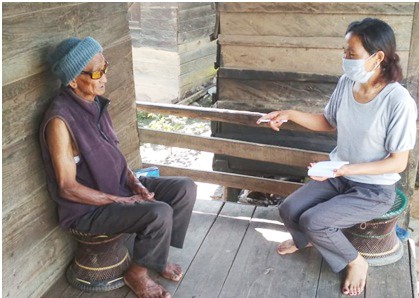A community cadre from the BBMU Longmatra reaching out to an elderly person. (Photo courtesy: NSRLM)

Morung Express News
Dimapur | June 21
Rural women in Nagaland have become an invaluable grassroots arm of the government effort to contain the spread of COVID-19. Far from the reaches of the mainstream media, all-women Self Help Groups (SHG) are quietly serving as a multi-tasking volunteer force for disseminating awareness to the rural masses.
The Nagaland State Rural Livelihoods Mission (NSRLM), according to a handout, has activated its network of 12,000 SHGs, working in coordination with the Deputy Commissioner and the Chief Medical Officer at the district level and the Village Councils and Village Development Boards at the village level.
Informing of the SHG’s services, an NSRLM official said that their services have not been confined to dissemination of information alone. “SHGs have taken the lead in Community Based Preparedness and Response by creating awareness on proper hygiene, collection and delivery of essential services to households, care for vulnerable persons, and facilitating access to entitlements through convergence with essential service departments,” the official said
While ensuring that the awareness disseminated by the government reaches the rural populace, the SHGs produced audio-visual messages in their respective local dialects.
She made mention of how SHG members in Kiphire’s Longmatra Block went door-to-door, with special emphasis on senior citizens, sensitizing them on the dos and don’ts. Similarly, SHGs in Mokokchung, took the initiative to look out for the elderly educating them on preventive measures and dispelling myths.
“They have been able to reach out to 1.10 lakhs rural households till date in collaboration with the resident ASHAs and ANMs,” she informed.
When supply of masks and hand sanitizers became limited, SHGs took the initiative largely self-funding the production of masks, as per the Health Ministry’s manual. Production of sanitizers was affected by limited availability of raw material but it did not stop volunteers in Mokokchung, Wokha, and Kohima from taking up the challenge.
In places where, procurement of essential commodities became challenging, SHG volunteers personally initiated the pooling of essential commodities – food, water, firewood and hygiene products — which were distributed to vulnerable households and frontline workers and supplying livestock and agriculture produce to the urban market.
An SHG in Mokokchung’s Longsa village, she added, organised the collection of vegetable produce from the village and supplying to vendors in Mokokchung town. “Now, farmers have a platform to sell their produce and generate income, as well as fulfilling the demand of citizens to address the problem of shortage of vegetables in the town areas.”
Besides sensitizing, the SHG cadre’s services have evolved into disinfecting the quarantine homes, monitoring the persons quarantined at the villages, and contributing towards construction of makeshift quarantine homes. In Mon’s Longwa village, SHGs constructed quarantine homes with the support of the village council and Student body.
“During such extraordinary times, it is very heartening to note the magnanimity of our community. These are just a few examples of the many lessons we can learn on the joy of giving, the zeal to uplift one another and the humanity that is innate in everyone,” the official said.






